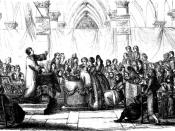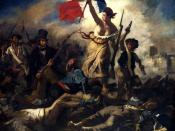The pivotal event of European history in the eighteenth century was the French Revolution. From its outbreak in 1789, the Revolution touched and transformed social values and political systems in France, in Europe, and eventually throughout the world. France's revolutionary regime conquered much of Western Europe with its arms and with its ideology. Though the Revolution was a bloody tragedy, many Europeans and non-Europeans came to see the Revolution as much more than just that. These people were more impressed by what the Revolution accomplished than by what it failed to do. They recalled the Revolution's abolition of serfdom, slavery, inherited privilege, and judicial torture; its experiments with democracy; and its opening of opportunities to those who, for reasons of social status or religion, had been traditionally excluded. Most substantially, the French Revolution provided the world with its first meaningful experience with political ideology.
The immediate effects of the French Revolution was the formulation of the Declaration of the Rights of Man.
This was one of the most constructive achievements of the French Revolution. The Rights of Man said that there would be equality of all persons before the law; equitable taxation; protection against loss of property through arbitrary action by the state; freedom of religion, speech, and the press; and protection against arbitrary arrest and punishment. This document served as a catalyst for the more lasting effects of the Revolution; the ideological legacy it furnished.
The revolutionaries advocated individual liberty, rejecting all forms of arbitrary constraint: monopolies on commerce, feudal charges laid upon the land, remnants of servitude such as serfdom, and even (in 1794) black slavery overseas. They held that political legitimacy required constitutional government, elections, and legislative supremacy. They demanded civil equality for all, denying the claims of privileged groups, localities, or religions to special...



Well done..
This was a very well written essay. I like the details and the conclusions sums up the whole thing. It should have a bibliography. Otherwise, a very good job.
2 out of 2 people found this comment useful.